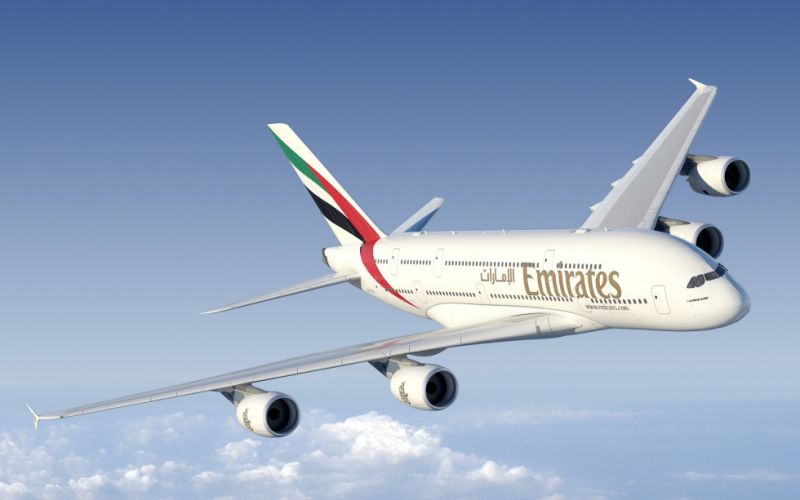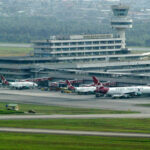
Last week Emirates Airlines had a spat with the federal government over its plan to introduce COVID-19 Rapid Antigen Test (RDT) for passengers to be administered four hours before take-off of their flight.
The federal government in response banned and unbanned the airline within 24 hours and since then Emirates has cancelled all its Lagos-Dubai and Abuja-Dubai flights with no indication of when the cancellation would end.
This antigen test was in addition to the PTF-COVID-19 approved 72 hours coronavirus test for international passengers leaving the country.
Emirates made it known in statement that it would embark on RDT test from February 1, 2021 for all its Nigerian passengers to Dubai and at the same time announced that there would be no more transit passengers to Dubai by other airlines.
The airline said it was submitting to the directive of the UAE authorities that decisively wished to ensure that nobody with COVID-19 case is allowed into the country.
But on February 4, 2021, the federal government through the Nigerian Civil Aviation Authority (NCAA) banned the airlines outbound flights and allowed its inbound flights, giving it 72 hours to rescind its decision on RDT tests on passengers leaving the country.
Government argued that the airline would not embark on such test until Nigeria was able to provide the necessary infrastructure for the test to take place.
But NCAA later issued another statement, indicating that Emirates had accepted to drop the RDT test, which prompted the regulatory authority to lift the ban.
But since the ban was lifted, Emirates has cancelled all its flights from Lagos and Abuja to Dubai and it issued a statement to that effect, saying that the cancellation would continue till further notice; thus indicating that it does not know when it would start airlifting Nigerians to Dubai.
President of the National Association of Nigeria Travel Agencies (NANTA), Susan Akporiaye told THISDAY that in as much as Emirates wanted to prevent travellers with COVID-19 cases from getting into Dubai, it also wanted to use that opportunity to cut down competition from other airlines.
She said Emirates is an airline known for its professionalism, noting that the idea of RDT was not well thought out by the airline before its implementation.
“If you look at that decision, you might want to say that they are using it to take care of their competitors. Because I have information that some other airlines have approached the UAE authorities and demanded to also conduct the antigen test.
“For instance, I spoke to the country manager of another foreign airline and I was told that they approached the UAE government and requested they be allowed to conduct the same antigen process at their airport, but they said no, totally stopping them. It is the same with Egypt Air. “So, the airline made it look as if they are using this COVID-19 to get rid of their competitors, although I don’t want to believe that is the case. But if you look at the indices, that’s the way it looks like, because if that’s not the case, then you shouldn’t stop other airlines from conducting the antigen test,” she said.
She also noted that by cancelling its flights after the federal government had lifted the ban against the airline, Emirates made Nigerian government to blink first and now wants to have the last laugh.
However, travel expert and organiser of Akwaaba African Travel Market, Ikechi Uko, noted that Emirates and the UAE authorities really wanted to ensure that there were no more COVID-19 cases in Dubai and had taken such drastic measure with RDT.
Uko remarked that Emirates had good intentions but its approach was wrong and that was why the federal government misunderstood its intentions, seeing it as a strategy to dominate the market.
“There is trouble in Dubai on issues concerning COVID-19 and that was why the UAE authorities took that measure, but the way Emirates approached the matter to Nigeria made the federal government misinterpret the airline’s intentions. UAE has the right to carry out its COVID-19 protocols but they cannot determine for Nigeria how she would carry out its own protocol,” Uko said.
THISDAY learnt that the European Union has also banned Emirates from bringing in-bound passengers to destinations in the region, while UK authorities allowed the airline to take outbound passengers but banned it from bringing passengers to the country.

But spokesman of NCAA, Sam Adurogboye told THISDAY that Emirates perceived aloofness is because Nigeria does not have strong and big airlines that could compete effectively with it on the Nigerian route; that if Nigeria has a national carrier or if the existing airlines grow big and strong to compete effectively with foreign carriers, Emirates would not so dominate the market.
“But they cannot afford to ignore Nigeria for long because I know the millions of dollars they make from our country,” Adurogboye said.






